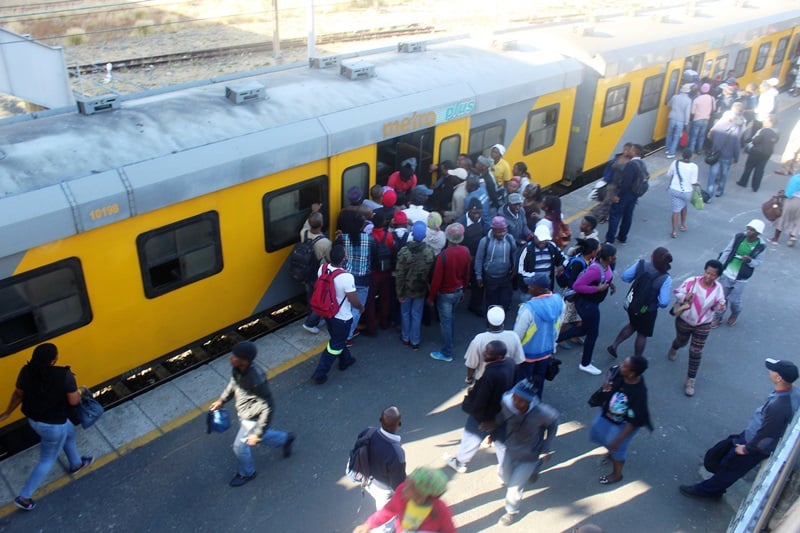
Abusive commuters, name-calling, being touched inappropriately.
The horror stories that train drivers have been relating lately highlight the difference between train systems in Gauteng, South Africa’s economic hub.
None of these stories were related by drivers of the Gautrains, which cater for the affluent. These drivers work for Metrorail, which is for the poor.
The trains are hardly on time, engines are often vandalised, and the drivers often become victims of crime.
It’s very different to the Gautrain service, which boasts state-of-the-art trains, orderly passengers and a very tight schedule.
During a recent meeting held to discuss the latest attacks on train drivers, a Passenger Rail Agency of South Africa train driver nearly burst into tears as she wondered out loud what went through her colleague’s mind when commuters stripped her naked and dragged her to the nearby bushes at Koedoespoort Station in Tshwane last Tuesday evening.
The woman train driver, who refused to be named, had a lucky escape earlier the same day. Trains to Mabopane were running late.
As soon as she drove into the station, commuters approached the driver’s cabin and demanded that she take them to Mabopane even though her train was headed elsewhere.
Gauging that the situation was getting out of hand, she called the control centre and requested permission to depart.
Fortunately, her request was granted.
She warned commuters who had jumped on to the tracks, she would ride over them, if they did not move out of the way.
They complied and she left the station.
“I love this job because I get to take South Africa to work and home but lately it’s traumatic,” she said.
She started working for Metrorail in the late 1990s as a guard and was excited when she was trained and eventually worked as a train driver in 2007.
She was soft-spoken at the beginning but had to toughen up to survive her working environment.
She even changed the way she walked, she said.
The married mother of three said commuters were very abusive: “They call us names you couldn’t imagine. As a woman I often get touched inappropriately.”
When looking for attention, commuters bang loudly against the driver’s cabin and jump on to the tracks in front of train to prevent it from leaving the station.
A male colleague was equally touched by the ordeal their workmate endured on Tuesday.
“I can’t imagine how she must have felt.”
He has also had several lucky escapes.
On Wednesday morning, Metrorail, a division of Prasa, announced that it was suspending train services on the Mamelodi corridor between Koedoespoort and Pienaarspoort stations following a series of attacks on its staff along the route.
At a meeting held that afternoon, both management and union representatives were united in their anger.
Train hijackings, where commuters force train drivers to a different destination than originally planned, have become commonplace in the Mamelodi corridor.
The rail agency’s provincial manager, Goodman Matampi, said six new trains had been vandalised and had their windscreens smashed. Each windscreen cost R85 000 to replace.
Matampi said a decision had been taken to form a task team to formulate a social compact with various stakeholders to ensure attacks on Prasa staff and infrastructure stop.
The stakeholders include the City of Tshwane, South African National Civic Organisation (Sanco) and commuter forums among others.
Though Metrorail issued a statement promising commuters refunds, only a handful who bought their tickets later into the month were entitled because train fare is heavily subsidised.
Police were called in and teargas was used when commuters protested at the absence of refunds at the Pretoria Station on Wednesday.
For their sins, commuters along the corridor will have to do without the train service for the time being. Withholding services has proven effective in the past, according to Prasa.
Consistent delays of up to three hours have been listed as a prime concern by commuters.
Prasa workers closest to the situation say trains often run late or are cancelled because the agency is not following its own rule book.
In addition, a large proportion of managers at the agency have been appointed into positions in an acting capacity, making it hard for them to make decisions that could later be used to justify why they cannot be appointed permanently.
Even Group CEO, Cromet Molepo, is acting while the board only has four of the requisite eight members.
Newly appointed Transport Minister Blade Nzimande would do well to make permanent appointments in these critical posts.
However, we should all ask ourselves, how it’s possible for a service such as the Gautrain to coexist in the same province where Metrorail operates.
A quick search on Google reveals that the two services’ accident records are incomparable.
Where Metrorail has had multiple accidents in recent years, with one killing more than 200 people early this year, Gautrain has had one derailment and an accident at its depot, where one person died and two others were injured.
Metrorail trains consistently run late, while Gautrain delays make headline news.
On the rare occasion that Gautrain services fail, its affluent commuters have a ready alternative in the form of its buses and their own vehicles.
Metrorail commuters’ lives, on the other hand, are thrown into turmoil whenever the service is interrupted.
For instance, the rail agency stated categorically in its press release on Wednesday it would not be providing alternate transport.
While a handful of Metrorail commuters received the much-needed refund, Gautrain commuter refunds are almost always guaranteed when the service is interrupted.
And as Molepo and his team grapple with the scourge of copper cable theft, the Gautrain had one or two incidents last year and no more.
They likely found a solution to the problem already.
Comparing the two services, it appears two decades into democracy South Africa is still perpetuating the spacial dividend by running two parallel development systems, one for the poor and another for the affluent.
• Sabela is Satawu’s spokesperson




 Publications
Publications
 Partners
Partners








